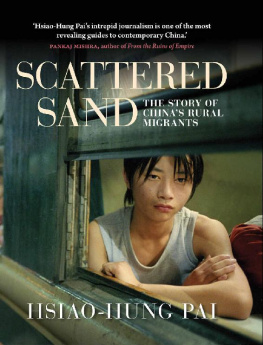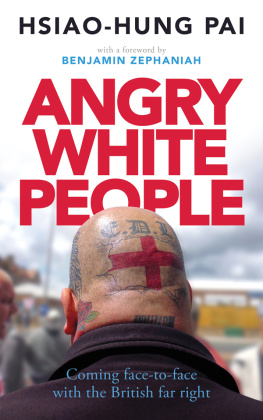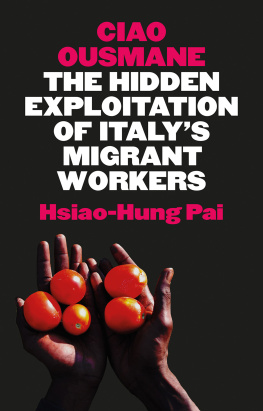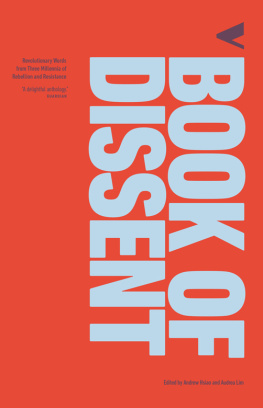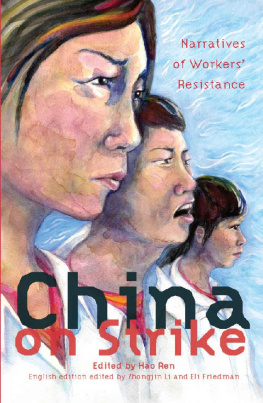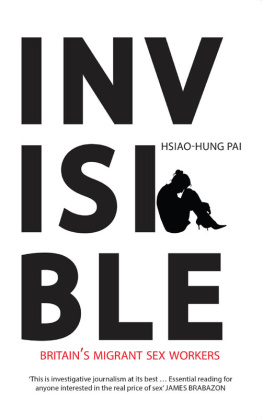Hsiao-Hung Pai - Scattered Sand: The Story of China’s Rural Migrants
Here you can read online Hsiao-Hung Pai - Scattered Sand: The Story of China’s Rural Migrants full text of the book (entire story) in english for free. Download pdf and epub, get meaning, cover and reviews about this ebook. year: 2012, publisher: Verso, genre: Detective and thriller. Description of the work, (preface) as well as reviews are available. Best literature library LitArk.com created for fans of good reading and offers a wide selection of genres:
Romance novel
Science fiction
Adventure
Detective
Science
History
Home and family
Prose
Art
Politics
Computer
Non-fiction
Religion
Business
Children
Humor
Choose a favorite category and find really read worthwhile books. Enjoy immersion in the world of imagination, feel the emotions of the characters or learn something new for yourself, make an fascinating discovery.
- Book:Scattered Sand: The Story of China’s Rural Migrants
- Author:
- Publisher:Verso
- Genre:
- Year:2012
- Rating:5 / 5
- Favourites:Add to favourites
- Your mark:
- 100
- 1
- 2
- 3
- 4
- 5
Scattered Sand: The Story of China’s Rural Migrants: summary, description and annotation
We offer to read an annotation, description, summary or preface (depends on what the author of the book "Scattered Sand: The Story of China’s Rural Migrants" wrote himself). If you haven't found the necessary information about the book — write in the comments, we will try to find it.
Scattered Sand: The Story of China’s Rural Migrants — read online for free the complete book (whole text) full work
Below is the text of the book, divided by pages. System saving the place of the last page read, allows you to conveniently read the book "Scattered Sand: The Story of China’s Rural Migrants" online for free, without having to search again every time where you left off. Put a bookmark, and you can go to the page where you finished reading at any time.
Font size:
Interval:
Bookmark:

SCATTERED SAND
THE STORY OF CHINAS
RURAL MIGRANTS
HSIAO-HUNG PAI
Preface by Gregor Benton

London New York
First published by Verso 2012
Hsiao-Hung Pai 2012
Foreword Gregor Benton 2012
All rights reserved
The moral rights of the authors have been asserted
1 3 5 7 9 10 8 6 4 2
Verso
UK: 6 Meard Street, London W1F 0EG
US: 20 Jay Street, Suite 1010, Brooklyn, NY 11201
www.versobooks.com
Verso is the imprint of New Left Books
eISBN: 978-1-84467-920-1
British Library Cataloguing in Publication Data
A catalogue record for this book is available from the British Library
Library of Congress Cataloging-in-Publication Data
Pai, Hsiao-Hung.
Scattered sand : the story of Chinas rural migrants / by Hsiao-Hung Pai ; preface by Gregor Benton.
p. cm.
ISBN 978-1-84467-886-0 (hbk.) ISBN 978-1-84467-920-1 (ebook)
1. Migrant laborChina. 2. Rural-urban migrationChina. 3. ChinaSocial
conditions21st century. 4. ChinaEconomic conditions21st century. I. Title.
HD5856.C5P35 2012
331.5440951dc23
2012016668
This book is dedicated, with much love,
to my parents, Hsiu-Hsiung and Judeh
Contents
Foreword
The present movement of Chinese peasants around the countryside, from the villages to the towns and cities, from China to the world, and around the world is the biggest mass migration in history. And it is among the worlds biggest social upheavals ever, dwarfing centuries of European migration to the United States. The rural migrants who are braving abuse by employers, discrimination by urban natives, and repeated crackdowns and restrictions by the authorities have driven Chinas economy to new heights and changed the face of Chinas cities, while the earnings they send home have helped lift villages out of poverty. Much of the migration is seasonal, however, and during slowdowns and crises its direction is reversed, as many of those laid off move back to the villages to share their poverty and await the next rising tide. By disappearing not only when they lose their jobs but also when they grow old, fall ill, or get pregnant, peasant migrants subsidize urban employers, the state treasury, and the lifestyle of richer urbanites.
Chinese rural-to-urban migration has been the subject of dozens of books and hundreds of articles, written by experts and based on prodigious research; their work is an exemplar among international migration studies. Over the past few years, high-quality writing on this subject in Chinese, English, and other languages has exceeded in quantity the entire output of all previous such work, yet in it, the voice of the migrant is seldom heard. The merit of this book is that it lets Chinese rural migrants speak for themselves, so that we can experience their world from their point of view and in their own words. Scattered Sand displays the same empathy and sense of authenticity as Chinese Whispers , Hsiao-Hung Pais acclaimed 2008 study of Britains hidden army of illegal Chinese labour. Both books maintain the rich tradition of socially progressive writing founded in China in the 1930s and revived in the 1980s, in which the narration is an act of collective identification and empowerment and a main aim is to give voice to the voiceless.
Hsiao-Hung Pai is a Taiwanese who was able to communicate uninhibitedly with her Chinese informants, which deepened her identification with them. As a person committed by nature to equity and justice, she is outraged by the self-interest of those in business and government who control migrant employment. Documenting abuses carried out on behalf of the rich and strong takes courage in a country where those forces monopolize power and are not used to being watched. Through her investigation, Ms Pai threatened the interests of the new composite class of officials, business people, and organized criminals who dominate the corrupt world of Chinese state capitalism. On several occasions, things could have turned nasty had her luck failed. As a British passport holder, she could count on some immunity, and she has a native ability to talk her way out of trouble. Even so, her work required greater nerve and determination than most people have.
What did her informants tell her? Having gained their confidence by showing sympathy and interest, she elicited a rich flow of ideas, views, and stories from them. Her journey starts and finishes at Moscows Yaroslavl Station, where she joins homeward-bound migrants on the Trans-Siberian Railway. They paint her a sobering picture of the often romanticized reality of international migration. The pillaging by predatory police and other authorities starts at the Russian border, intensifies at the destination, and is rounded off with a final shakedown on re-entry into China. Migrant traders suffer endless official rip-offs in Russia and occasional attacks by xenophobic skinheads. Migrant labourers, driven out of China by poverty and despair, are paid pittances by their Russian employers and milked dry by the Chinese agents who recruit and run them. Those who publicly resist the abuse risk fines and deportation.
This picture bears little resemblance to that of the footloose globe-trotter moving around the world in a cocoon of global Chinese capitalism and culture, a representation that can be found in some writings of the currently influential school of transnational studies. Hsiao-Hung Pais important contribution to the debate on transnationalism and Chineseness is her unrelenting focus on the different fates that await rich and poor. Where other authors celebrate the migrants mobility in a frictionless, deterritorialized age of transilience and flexible citizenship and play down the poverty, racism, and sexism of their world, she focuses on the permanent journey of the mobile proletariat and the role of the hostile state at home and overseas in controlling and exploiting the petty trader and the migrant worker.
The bulk of the book records Hsiao-Hung Pais encounters with rural migrants in Chinese towns and cities. They can suffer poor health, accidents, and even death through their work, and they are too poor to buy insurance. They accumulate debts they cant pay off. Local residents are more likely to show them contempt than fellow feeling. Their relations with agents and employers are rarely governed by rules, regulations, or contracts. The state-run labour unions make no effort to recruit or represent them, and they cant afford legal arbitration. When their bosses fail to pay them for months on end, or bully and deceive them, or subject them to other arbitrary abuses, they have no remedy. They are ghosts, people with no officially sanctioned existence, subject to routine harassment and random cruelty and violence. They live in ghettoes, aliens in their own country. Because conditions for them in China are so dire, many will do practically anything to get themselves or even their unaccompanied children to the rich West, where again they face oppression and discrimination.
An even worse life is that of the ethnic migrants, the non-Han segments in the Han cities, who form minorities within the minority and live in ghettoes within the ghetto. They are even more likely than the general migrant population to suffer random police searches on the streets and maltreatment by authorities and members of the Han majority. This is especially true in the current political climate, where the establishment is playing the dangerous game of stoking Han chauvinism disguised as Chinese patriotism. Hsiao-Hung Pai describes two of these internal colonies, Yi and Uighur.
Next pageFont size:
Interval:
Bookmark:
Similar books «Scattered Sand: The Story of China’s Rural Migrants»
Look at similar books to Scattered Sand: The Story of China’s Rural Migrants. We have selected literature similar in name and meaning in the hope of providing readers with more options to find new, interesting, not yet read works.
Discussion, reviews of the book Scattered Sand: The Story of China’s Rural Migrants and just readers' own opinions. Leave your comments, write what you think about the work, its meaning or the main characters. Specify what exactly you liked and what you didn't like, and why you think so.

